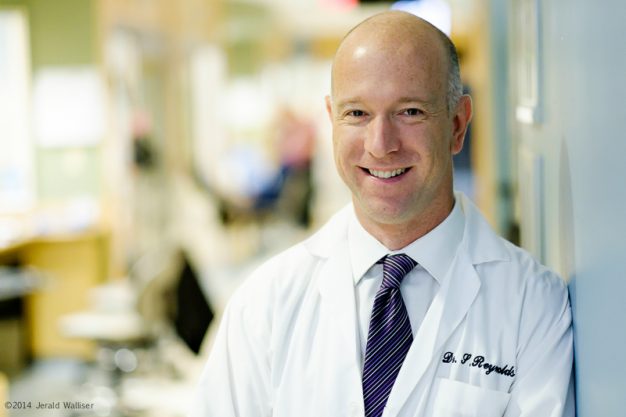Dr. Steve Reynolds has been awarded the Royal Columbian Hospital Foundation Professorship in Critical Care at Simon Fraser University.
The collaboration between a Simon Fraser University professor and a critical care physician at Royal Columbian Hospital to wean seriously ill and injured patients off mechanical ventilators will benefit from a new research position established by the hospital’s foundation.
Dr. Steve Reynolds has been awarded the Royal Columbian Hospital Foundation Professorship in Critical Care at Simon Fraser University. The $250,000, five-year professorship will support his research, aimed at saving lives and health costs.
Reynolds is working with SFU professor Andy Hoffer and Burnaby-based Lungpacer Medical Inc. to advance the Lungpacer Diaphragm Pacing System. The technology aims to improve patients’ chances of re-establishing diaphragm strength for a faster return to unassisted breathing.
The longer patients are on ventilators, the greater the risk of ventilator-induced lung injuries and other life-threatening complications, such as ventilator-acquired pneumonia and infection.
The researchers say the need for a solution is critical. “The longer a patient is on mechanical ventilation, the more the diaphragm weakens,” says Reynolds. “The more the muscle weakens, the less likely it is that the patient will ever be able to breathe without assistance.”
Hoffer founded Lungpacer Medical Inc., his third SFU spin-off company, jointly with SFU in 2009. Lungpacer technology activates phrenic nerves that originate in the neck and pass between the lung and heart to reach the diaphragm. Stimulating the nerves activates the diaphragm and is expected to improve its ability to function.
An intravenous catheter with embedded electrodes is temporarily placed to electrically pace the diaphragms of patients on mechanical ventilators, in order to build diaphragm strength and endurance and enable them to more quickly and successfully wean from the ventilators.
“From the first day we met, Steve has helped shape our collective thinking on treating critically ill ventilator-dependent patients and testing pacing concepts in pre-clinical and clinical studies,” says Hoffer.
“He made excellent research contributions in the limited time available around his clinical duties. This professorship will give him more time to research additional questions we are itching to solve in our exciting and productive collaboration.”
Hoffer and Reynolds have been working together with Lungpacer Medical on this technology since 2011 and have received CIHR grant funding since 2013.
“We value the opportunity to work together,” says Reynolds. “Andy has extensive knowledge in biomedical physiology, in running a lab and in developing medical devices. My work, as a clinician, keeps me grounded in the day-to-day running of a critical care unit, and helps to ensure that the development of the device and the research in general has real-world capability. With the support of Lungpacer Medical we have made great progress.”
Jeff Norris, Royal Columbian Hospital Foundation president and CEO, says, “It’s a priority of ours to support the research efforts of those at Royal Columbian who care for patients with critical, life-threatening issues that few other hospitals are equipped to treat. We all benefit from Dr. Reynolds’s passion and drive to find absolute excellence in care.”
The announcement comes as Royal Columbian Hospital begins a significant expansion and acts as the anchor for the IDEA Centre, the City of New Westminster’s emerging economic healthcare cluster.
“Royal Columbian Hospital and its foundation have long been pillars of the New Westminster community, excelling in clinical care, education and research,” says New Westminster Mayor Jonathan Coté, an SFU alumnus.
“The announcement of Dr. Reynolds’s research professorship in a partnership between the foundation and SFU highlights the advanced degree of innovation taking place at the hospital.”
SFU Vice-President Research Joy Johnson adds: “This partnership of innovation is a testament to the power of collaboration and supports the university’s goal to leverage community connections and become a global leader in research mobilization.”
Clinical trials using the Lungpacer Diaphragm Pacing Therapy System are planned for 2017.
Fast facts:
• Currently, 25-30 per cent of patients on ventilators experience difficult or prolonged weaning, become the most expensive hospital in-patients, and many die in hospital.
• In 2017 the researchers hope to undertake a long-term study with hospitals in the U.S. to study the design’s effectiveness
• Lungpacer Medical Inc. moved two years ago from the University’s Neurokinesiology Lab to its own commercial premises in Burnaby and now employs 25 staff.
https://youtu.be/HbI5PtFRL84
SFU partners with Royal Columbian Hospital Foundation for new Professorship in Critical Care.

